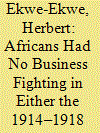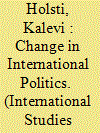|
|
|
Sort Order |
|
|
|
Items / Page
|
|
|
|
|
|
|
| Srl | Item |
| 1 |
ID:
183670


|
|
|
|
|
| Summary/Abstract |
The wars of 1914–1918 and 1939–1945 are without parallel in the expansive stretch of decades of the pan-European conquest and occupation of Africa in creating such profound opportunity to study the very entrenched desire by the European conqueror-states in Africa to perpetuate their control on the continent and its peoples indefinitely. The two principal protagonists in each conflict, Britain and Germany, were the lead powers of these conqueror-states that had formally occupied Africa since 1885. Against this cataclysmic background of history, Africans found themselves conscripted by both sides of the confrontation line in 1914–1918 to at once fight wars for and against their aggressors during which 1 million Africans were killed. Clearly, this was a case of double-jeopardy of conquered and occupied peoples fighting for their enemy-occupiers. In the follow-up 1939–1945 war, when Germany indeed no longer occupied any African land (having been defeated in the 1914–1918 encounter), Britain and allies France and Belgium (all continuing occupying powers in Africa) conscripted Africans, yet again, to fight for these powers in their new confrontation against Germany, and Japan, a country that was in no way an aggressor force in Africa. Hundreds of thousands of Africans were killed in this second war. In neither of these conflicts, as this study demonstrates, do the leaders of these warring countries who occupied (or hitherto occupied) Africa ever view their enforced presence in Africa as precisely the scenario or outcome they wished their own homeland was not subjected to by their enemies. On the contrary, just as it was their position in the aftermath of the 1914–1918 war, Britain, France, Belgium, Spain and Portugal in 1945 each envisaged the continuing occupation of the states and peoples of Africa they had seized by force prior to these conflicts. Winston Churchill, the British prime minster at the time, was adamant: ‘I had not become the king’s first minister in order to preside over the liquidation of the British Empire’. Charles de Gaulle, leader of the anti-German ‘free French forces’, was no less categorical on this score: ‘Self-government [in French-occupied Africa, Asia, the Caribbean, South America, the Pacific and elsewhere in the world] must be rejected – even in the more distant future’.
|
|
|
|
|
|
|
|
|
|
|
|
|
|
|
|
| 2 |
ID:
160049


|
|
|
|
|
| Summary/Abstract |
This essay notes the major changes in actors, institutions, and processes of international politics over the last four centuries. It emphasizes wars, revolutions, and the dreams of major historical figures such as Nepoleon and Hitler as the major sources of change. Important legacies of these changes include norms that have de-legitimized territorial conquest and organizations committed to the peaceful resolution of international conflicts.
|
|
|
|
|
|
|
|
|
|
|
|
|
|
|
|
| 3 |
ID:
181669


|
|
|
|
|
| Summary/Abstract |
For many centuries, conquest was commonplace, and its attractiveness was central to the character of international politics. Why has it declined? Existing theories cannot explain why powerful countries no longer conquer states with easily extractable wealth. We develop an explanation based on the relationship between a potential conqueror's economic productivity and its ability to profit from conquest. Productivity has opposing effects on conquest's profitability: it raises the opportunity cost of each asset diverted to conquest, but also reduces the quantity of assets required for conquest. The net effect is determined by the composition of investment in innovation. We document that since at least 1950 investment has been predominantly aimed at civilian, not military innovations, so that rising productivity should reduce conquest's net profitability. Using cost analyses of comparable wars, we estimate bounds on the profitability of conquering the oil and gas reserves of the Persian Gulf, a very tempting target, for the United States and Iraq, two potential conquerors of widely differing productivity. Though both mechanisms operate, we find that the net effect of higher productivity is to reduce the profits from conquest. Moreover, this net effect is large enough to render conquest generally unprofitable for contemporary high-productivity states.
|
|
|
|
|
|
|
|
|
|
|
|
|
|
|
|
|
|
|
|
|